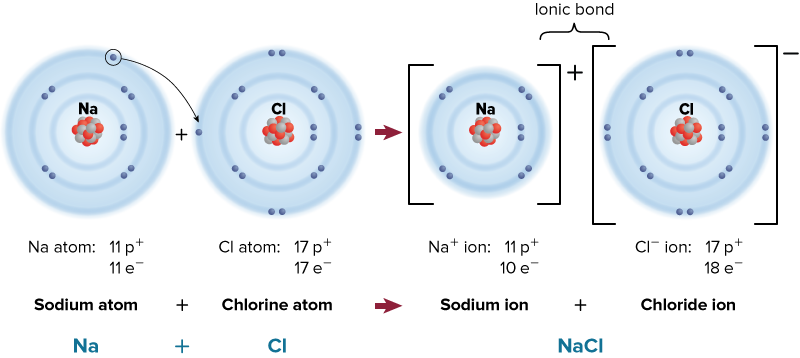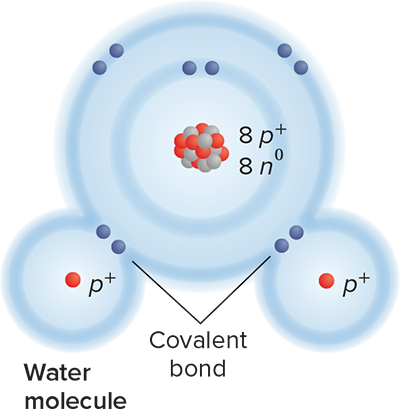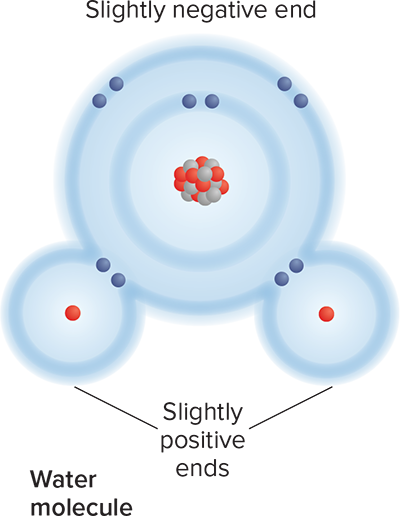Biology- Module 6: Chemistry in Biology
5.0(1)
5.0(1)
Card Sorting
1/44
Study Analytics
Name | Mastery | Learn | Test | Matching | Spaced | Call with Kai |
|---|
No study sessions yet.
45 Terms
1
New cards
Atom
building block of matter; contains subatomic particles— neutrons, protons, and electrons.
2
New cards
Nucleus
center of an atom; contains neutrons and protons. In eukaryotic cells, the central membrane-bound organelle that manages cellular functions and contains DNA.
3
New cards
Proton
tiny atomic particle that has mass and a positive electric charge.
4
New cards
Neutron
particle without a charge in an atom’s nucleus. (Neutral)
5
New cards
Electron
tiny atomic particle with little mass and a negative electric charge; an atom’s electrons are equal in number to its protons and are located in a cloud-like region surrounding the nucleus.
6
New cards
Element
natural or artificial substance that cannot be broken down into simpler substances by physical or chemical means.
7
New cards
Isotope
two or more atoms of the same element having different numbers of neutrons.
8
New cards
Compound
substance composed of atoms of two or more different elements that are chemically combined.
9
New cards
Ion
atom that is negatively or positively charged because it has lost or gained one or more electrons.
10
New cards

Ionic Bond
electrical attraction between two oppositely charged atoms or groups of atoms.
11
New cards

Covalent Bond
attraction of two atoms for a shared pair of electrons that holds the atoms together.
12
New cards
Molecule
compound whose atoms are held together by covalent bonds.
13
New cards
Chemical Reaction
change of one or more substances into other substances.
14
New cards
Reactant
substance that exists before a chemical reaction starts; located on the left side of the arrow in a chemical equation.
15
New cards
Product
substance formed by a chemical reaction; located on the right side of the arrow in a chemical equation.
16
New cards
Activation Energy
minimum amount of energy needed for reactants to form products in a chemical reaction.
17
New cards
Catalyst
something that stimulates activity among people or forces.
18
New cards
Enzyme
protein that speeds up a biological reaction by lowering the activation energy needed to start the reaction.
19
New cards
Substrate
reactant to which an enzyme binds.
20
New cards
Active Site
specific place where a substrate binds on an enzyme.
21
New cards

Polar Molecule
molecule with oppositely charged regions.
22
New cards
Van Der Walls Forces
attractive forces between molecules.
23
New cards

Hydrogen Bond
forms when the positive ends of some water molecules are attracted to the negative ends of other water molecules; they cause water’s surface to contract and allow water to adhere to and coat a solid.
24
New cards
Mixture
combination of two or more different substances in which each substance keeps its individual characteristics; can have a uniform composition (homogeneous) or have distinct areas of substances (heterogeneous).
25
New cards
Solution
homogeneous mixture whose components cannot be distinguished and can be classified as liquid, gaseous, solid, or a combination; the method of transport for materials that are dissolved in a stream’s water.
26
New cards
Solvent
substance in which another substance is dissolved.
27
New cards
Solute
substance dissolved in a solvent.
28
New cards
Suspension
Over time, the parts settle to the bottom.
29
New cards
Colloid
Homogeneous mixture where the particles do not settle out.
30
New cards
Acid
solution containing a substance that produces hydrogen ions: (H+) in water.
31
New cards
Base
substance that produces hydroxide ions (OH–) in water .
32
New cards
Buffer
mixture that can react with an acid or a base to maintain the pH within a specific range.
33
New cards
Organic Chemistry
Separate branch of science that is dedicated to the study of compounds containing carbon.
34
New cards
Macromolecule
large molecule formed by joining smaller organic molecules together.
35
New cards
Polymer
large molecule formed from smaller repeating units of identical, or nearly identical, compounds linked by covalent bonds.
36
New cards
Four Macromolecules
Carbohydrates, Lipids, Proteins, Nucleic Acids.
37
New cards
Carbohydrate
organic compound containing carbon, hydrogen, and oxygen in a ratio of one oxygen and two hydrogen atoms for each carbon atom.
38
New cards

Monosaccharides, Disaccharides, Polysaccharides
Different chains of carbohydrates.
39
New cards
Lipids
Large, non-polar biological molecules that vary in structure, store energy in living organisms, and make up most of the structure of cell membranes.
40
New cards
Protein
organic compound made of amino acids joined by peptide bonds; primary building block of organisms. Involved in almost every process within the human body.
41
New cards
Amino Acid
a building block of proteins.
42
New cards
Nucleic Acid
complex macromolecule that stores and communicates genetic information.
43
New cards
Nucleotide
a sub-unit of nucleic acid formed from a simple sugar, a phosphate group, and a nitrogenous base.
44
New cards
Law of Conservation of Matter
Matter cannot be created or destroyed.
45
New cards
Four Elements in Living Things
CHON- Carbon, Hydrogen, Oxygen, and Nitrogen.